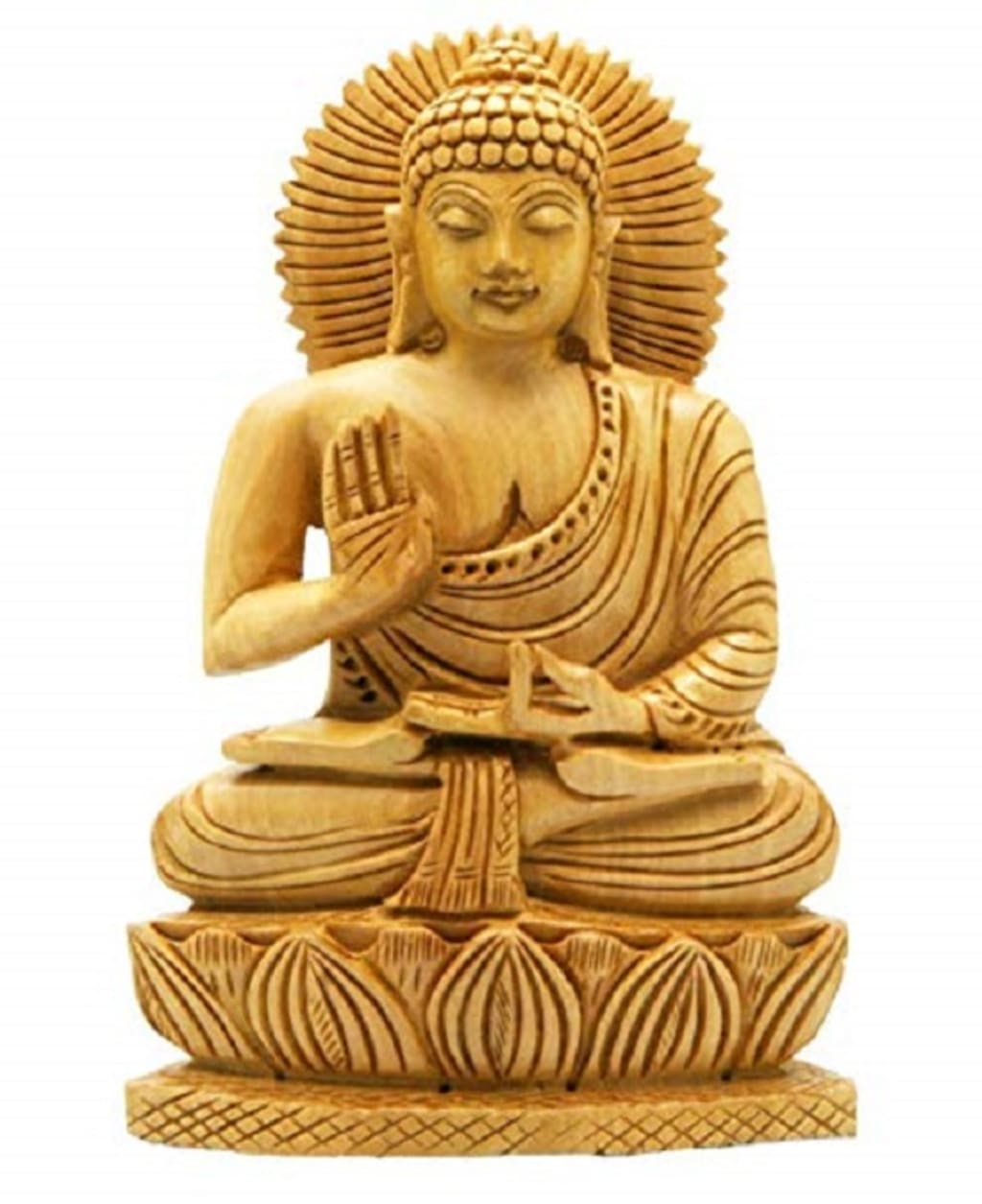Gradual or Sudden
Buddhists debate endlessly whether awakening is gradual or sudden

Is awakening sudden, or gradual?
It is well to use the term, "awakening," rather than "enlightenment," because "enlightenment" tends to invoke a lot of beliefs and assumptions that get in the way more than point to the path. Soon after his own awakening, a passerby saw him and asked him what he was.
He replied, "I am awake."
In his fifty years of teaching after that, the Buddha would emphasize that all humans have the capacity to awaken as he had, but most of us failed to realize this potential.
Buddhism is chock a block with paradoxes. If you study Buddhism and stumble across a paradox, try just to abide with it, and let it resolve itself as your understanding unfolds. You're not stupid, and neither is Buddhism. Human life is full of paradoxes, too.
One big paradox is that Buddhists at once disparage and venerate human lives. Some Buddhist wags say that human life is an invariably fatal, sexually transmitted disease. The early Zen master, Dogen, said that "we must make one mistake after another." Another Buddhist teacher confirms that all of human life is just one big mistake. If we really understood what is going on, we would not be here.
At the same time, Buddhists talk about "precious human birth." Of all the options, even the gods, being born human is the best, because it combines the ability to hear and practice the dharma (the truth that the Buddha and all genuine teachers reveal) with enough unpleasantness to serve as a goad to practice. We want to awaken, because without practice leading to awakening, we are sleep walking, and we keep stumbling over the furniture of our lives and hurting ourselves. The Buddha found inspiration to seek awakening when he learned that no human can avoid old age (if you're lucky), sickness, and death.
You have a human lifetime. Use it to awaken.
Gradual or Sudden
To some extent, this is an entirely academic debate in the sense of not having much importance to our lives. Just pursue awakening and find out what happens.
One hazard of a human existence is that our huge brains are our greatest blessing and our greatest curse. We have to use our brains to grasp the teachings of the Buddha and to practice them, but those brains will also throw all manner of obstacles in our way.
We have a bad habit of trying to plan everything, even though at the broadest level, our ability to control the events in our lives is very limited. Buddhists often speak of "the path." The Buddha described his own teachings as "the noble eightfold path," or a path with eight major components.
Buddhist teachers also like to say, "the path is the goal," which is a way of trying to discourage us plan-inclined humans to try to think too far in advance. One Buddhist teacher said the truth is so close that you cannot see it.
If you've ever driven towards the Rocky Mountains from the east, a lot of the fun (looking for fun gets important as you drive across the very flat, boring plains of eastern Colorado or Wyoming, especially if you've just driven across Kansas or Nebraska) is eagerly looking to the western horizon for the first glimpse of the tall peaks in the distance.
That's fun. Buddhists have no objection to fun. In almost any photo of a Buddhist teacher, you will find them smiling. The Dalai Lama is always smiling. He's not necessarily a barrel of fun in the modern, US sense. He is an old man who grew up in Tibet in a culture that was premodern in important ways. But he's happy, and he's not opposed to fun.
But most Buddhists are pretty serious about their practice. Sitting and meditating for hours takes effort and dedication. It's not always fun. In fact, it's often not much fun at all. It can be boring. It can be painful, especially if you're sitting on the floor (which is not essential—if you just cannot sit on the floor, sit in a chair).
If you're the over thinking type, then you may decide, since you're on a path, you want to know how far you have to go, and what to look for. Zen master Seung Sahn has a book called, Wanting Enlightenment is a Big Mistake. Wanting, in the sense of grasping for things you don't already have, is a mistake in Buddhism. THE mistake, sort of. Remember, the Buddha said we all have the capacity to awaken already, we just miss it. Think about the standard joke about the person who can't find their glasses, only to discover them on top of their head. It is possible to have something very important immediately at hand and under your control and not realize it.
So you may want to know if awakening happens gradually or suddenly.
Paradox alert: both.
Think about planting an apple tree. If you go out every day to look at your apple tree, after a while, when the season arrives, flowers will appear on the tree. The flowers will become the beginnings of apples, which in turn will grow into apples. All of this will happen very gradually. Some days, you may not see any difference at all. But eventually, if you leave the apple on the tree, it will ripen. Eventually, it will fall off of the tree, since, from the tree's perspective, the apple it just a way for it to propagate itself by distributing its seeds via a vehicle that is visually appealing and tasty.
The old story about Isaac Newton realizing gravity as a law of nature says that an apple fell on his head. This is likely a myth, but if it really happened, we don't know if he looked up at the apple before sitting under it, but even if he did, he might not have been able to discern that the apple would soon fall from the tree. It was just an apple, and apparently did not do much harm if it did hit Newton in the head, so he might not even have noticed it, but if he did, he likely could not tell it was about to fall from the tree.
After all that very slow, very gradual growth. the moment that the apple falls from the tree comes suddenly and unpredictably. Zen in particular (it is a common misuse in the United States to treat the terms, "Zen" and "Buddhism" as if they mean the same thing. Zen, a particular school of Buddhism—there are many others—is full of stories in which a student works for years in pursuit of awakening, never knowing if he will achieve it or not. Such stories always include a teacher who realizes the moment of the student's awakening has arrived, and brings it about, usually by hitting the student, although sometimes some unexpected sound brings about the student's final awakening.
In Zen monasteries, it is routine for assistants to strike monks on the back with a stick in order to make sure they are awake and focused. The book The Three Pillars of Zen includes transcriptions of several conversations between a Zen master and students, in which a topic of discussion is whether the student wants to get hit with the stick. The master is aware that a lot of western students do not like to get hit, and will put a sign over such students directing the person wielding the stick not to strike them if they wish.
This is different in the sense that striking Zen students is a routine, daily occurrence, not timed to produce awakening in any individual student, but the point is that striking students is a common practice in Zen, and can be the occasion of awakening by the student.
But pretty much everyone agrees that students in other schools have achieved complete awakening using other methods. If you want to pursue awakening according to the teachings of the Buddha, look up the nearest Buddhist establishment, and go to their regular meditation session. They may have information about when they offer instruction in meditation. You'll need some instruction to get started. One good thing about Buddhists is that they don't much argue with each other over whose school or method is superior or correct. Pick one that is convenient, or that you like for whatever reason, and stick to it. Develop a serious, dedicated meditation practice, and after some indeterminate period, you will suddenly awaken.
About the Creator
William Turner
Ph.D. in U.S. history from Vanderbilt, with an emphasis in the history of public policy; two articles published as a graduate student, two books as a historian. J.D. from the University of Wisconsin; eight law review articles in print.






Comments
There are no comments for this story
Be the first to respond and start the conversation.